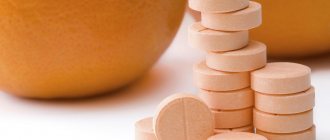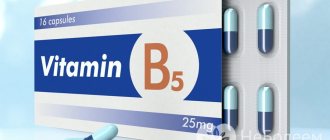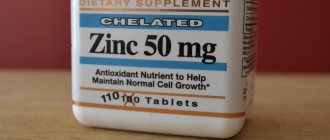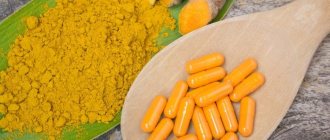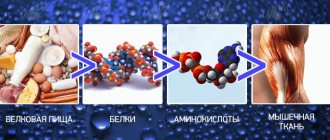The importance of vitamin B1 for people is undeniable. Doctors say that situations are increasingly encountered when there is an urgent need for the administration of this substance. With thiamine deficiency, the risk of developing serious pathologies of the endocrine, nervous or brain systems increases, which include thyrotoxicosis, pancreatitis, Wernicke-Korsakoff syndrome or brain damage. In such cases, the drug Thiamine hydrochloride is used.
This is a synthetic analogue belonging to water-soluble vitamins. When prescribed, patients have many questions regarding Thiamine hydrochloride - what kind of vitamin it is, are there any side effects when using it, are there any contraindications, etc. The medication is used for medical reasons to compensate for B1 deficiency. As with any other medications, when using the drug, you should strictly follow the instructions for use. We will now tell you in detail about the features of using the medication.
Pharmacological properties
Pharmacodynamics
In the body, thiamine hydrochloride (vitamin B1) is converted into active thiamine pyrophosphate and, as a coenzyme, is part of two complexes: α-ketoglutarate decarboxylase and pyruvate decarboxylase. Which take part in the oxidative decarboxylation of α-ketoglutaric and pyruvic acids.
Pharmacokinetics
When administered intramuscularly, thiamine hydrochloride is quickly and completely absorbed.
The distribution throughout all tissues and organs is quite uniform. The concentration in the blood is relatively low, while mainly free thiamine circulates in the plasma, its phosphorus esters circulate in leukocytes and erythrocytes.
Phosphorylation of the substance occurs in the liver. The most active phosphorus ester is thiamine diphosphate, which has coenzyme activity. Accumulation occurs mainly in the spleen, kidneys, brain, liver, and heart. Up to 50% of the total amount of thiamine hydrochloride is found in the myocardium and striated muscles, approximately 40% is found in the internal organs.
Excretion is carried out by the kidneys and through the intestines.
What foods contain thiamine?
The element is present in products of animal and plant origin. There is especially a lot of thiamine in the muscle tissue of pigs. You can also find useful substances in offal - liver, lungs, kidneys - they contain a lot of thiamine. There is much less of the element in poultry meat. The largest amount is found in broilers. A list of foods rich in vitamin B1 that are beneficial for people of all ages. Most vitamin B1 is found in:
- pork;
- egg yolk;
- tuna;
- granular sturgeon caviar;
- baked loin;
- heart;
- liver.
Among products of plant and other origins, the leaders in the amount of the element are:
- Walnut;
- soy;
- Wheat flour;
- pasta;
- oat groats;
- yeast;
- green pea.
A small amount of the substance is found in vegetable and fruit juices, berries, grapes, and mushrooms.
Daily value of vitamin b1
Determining the daily requirement of vitamin B1 is purely individual. People's need for thiamine mainly depends on age and gender. Adult men require 1.2 -2.1 mg. Children need 0.3 – 1.5 mg. Elderly people - about 1.4 mg. The daily requirement of vitamin B1 for women is 1.5 mg of the substance per day. During pregnancy the need increases.
Indications for use
Thiamine hydrochloride is prescribed for hypo- and vitamin B1 deficiency.
The drug is also used to treat conditions that are associated with vitamin B1 deficiency:
- beriberi disease, pathologies of the nervous system (Wernicke encephalopathy, poly- and mononeuropathy, neuralgia, including herpes zoster and myalgia);
- malabsorption syndrome of various origins, being on tube feeding;
- pathologies of the cardiovascular system;
- conditions developing against the background of alcoholism, diabetes, therapy with chemotherapeutic and antibacterial agents and drugs that suppress the intestinal flora, which synthesizes B vitamins;
- conditions during prolonged administration of hypertonic glucose solutions associated with renal pathology, as well as use in patients who are on hemodialysis, etc.
The drug in the dosage form of an injection solution can be used in all clinical situations if it is necessary to quickly eliminate vitamin B1 deficiency and the impossibility of oral administration.
Conditions for dispensing from pharmacies
Triamine, Taminase and other B1-based drugs are available by prescription only.
Release form and composition
The drug is sold in the form of clear solutions that are used intravenously in injections. The substance may have a yellowish or greenish-yellowish tint.
The active ingredient is tamine hydrochloride, and additional additives are unitol and water.
The substance is sold in cardboard boxes with partitions; the compartments contain 10 ampoules of 1 ml each. In addition, the medicine is available in tablets.
Terms and conditions of storage
Preparations containing vitamin B1 should be stored at temperatures up to +25° C, away from small children. Its service life reaches 2 years.
Thiamine hydrochloride, instructions for use: method and dosage
Thiamine hydrochloride solution should be administered deeply intramuscularly.
Dosage regimen for adults: 1 time per day, 25–50 mg (0.5–1 ml) daily. Therapy should be started with small doses (up to 25 mg). If well tolerated, the dose is increased by 25 mg per day. The maximum dose is 300 mg per day. The duration of the course of treatment is from 10 to 30 injections.
For children, the drug is prescribed once a day, 12.5–25 mg. Due to the complexity of dosing, patients in this age group are recommended to use the drug in a different dosage.
Signs and causes of vitamin deficiency in the body
The daily intake of thiamine for a child is 0.5 – 1.7 milligrams, for women – 1.3 – 2.2, for men – 1.6 – 2.5.
During pregnancy, for the full formation of the fetus, the need for vitamin B1 increases and reaches 2.5 milligrams per day. The lack of a beneficial compound in the body carries a potential threat of improper organ development and the appearance of abnormalities in the functioning of the central nervous system of the unborn baby. A woman experiences thiamine deficiency especially painfully in the third trimester, when severe pain occurs in the hips and lower back due to pressure from the uterus on the nerve plexuses. Therefore, it is important to ensure that the pregnant woman systematically compensates for the deficiency of the vitamin and consumes foods rich in it every day.
Definition of hypovitaminosis B1
Primary symptoms:
- numbness of hands, feet;
- deterioration in the functioning of nervous tissue;
- increased irritability, tearfulness, anxiety;
- chilliness at any ambient temperature;
- Wernicke-Korsakoff syndrome (observed in patients suffering from alcohol dependence);
- memory loss;
- skin itching;
- increased fatigue;
- hand trembling;
- insomnia;
- headache;
- depression;
- muscle weakness;
- deterioration of coordination;
- diarrhea;
- increase in liver size;
- decreased appetite;
- weight loss;
- nausea;
- gastrointestinal disorders;
- burning in the epigastric region;
- constipation;
- arterial hypotension;
- cardiopalmus;
- unstable, rapid pulse;
- shortness of breath with slight exertion;
- heart failure;
- tachycardia.
In the complete absence of thiamine, a serious beriberi disease occurs: harmful acids (lactic, pyruvic) accumulate in the body, carbohydrate metabolism is disrupted, and the heart muscle, nervous system, and digestive tract are affected. Severe exhaustion and anorexia sets in.
Due to the fact that the nutrient is not able to accumulate in the body, it is important to constantly replenish its reserves, otherwise vitamin deficiency gradually sets in.
Causes of vitamin B1 deficiency
- Regular coffee intake. Daily consumption of a caffeinated drink results in the release of large amounts of hydrochloric acid, which destroys 50% of thiamine in the body.
- Reducing the volume of coarse fiber (bran) in plant materials. Products depleted in thiamine - polished rice, white bread, extra oatmeal, bleached grains.
- Consumption of refined carbohydrate foods (bakery and confectionery products, pastries, pasta). Regular intake of such products increases thiamine deficiency by 3 times.
- Long-term heat treatment of food. If food is cooked at a temperature of 200 degrees for 45 minutes, the loss of active thiamine reaches 50%.
- Canning vegetables and fruits. Sterilization of products for 20 minutes leads to the loss of 25% of the vitamin.
- Profuse sweating.
- Presence of chronic infectious diseases.
- Pregnancy. In the last trimester, a woman’s need for nutrients doubles. Therefore, for expectant mothers, the daily dosage of thiamine should be 3 milligrams.
- Excessive heating or hypothermia of the body.
Deficiency of thiamine over a long period of time (more than a year) leads to disruption of the metabolism of fatty acids and a decrease in the rate of formation of a cellular energy source. This means that glucose received with food is not able to transform into an ATP molecule, as a result, toxic products of incomplete processing of carbohydrates (pyruvate, lactic acid) accumulate in the blood. These metabolites, penetrating the tissues of the brain and spinal cord, disrupt their proper functioning and provoke the development of neurological diseases. Timely identification and elimination of factors contributing to water-soluble vitamin deficiency in the body will help prevent the risk of disorders.
Side effects
When using Thiamine hydrochloride, adverse reactions may develop regardless of the dose.
Allergic reactions are possible (in the form of urticaria, skin itching, angioedema, rarely - anaphylactic shock), in addition, they can manifest themselves in the form of disorders of the gastrointestinal tract, other systems and organs.
Hypersensitivity reactions according to systemic organ classes:
- respiratory system: bronchospasm, shortness of breath;
- cardiovascular system: tachycardia;
- skin and subcutaneous tissues: exanthema, rash.
Also in rare cases, reactions are possible at the injection site of the solution: pain at the injection site, increased sweating.
Description
Thiamine is very important for the human body and plays an important role in protein, carbohydrate and fat metabolism, as well as in the processes of nerve excitation in synapses. It protects the cell membrane from the effects of peroxidation toxins.
Thiamine in Latin Thiamine Chloride has many benefits and promotes:
- improving brain function;
- concentration;
- increases sensitivity to receiving new information;
- stimulates bone and muscle growth;
- slows down the human aging process;
- improves mood;
- relieves motion sickness and helps get rid of seasickness;
- maintains muscle tone of the digestive tract;
- improves appetite;
- normalizes the functioning of the heart muscle;
- reduces the intensity of toothache.
Compound
1 milliliter of medicine contains 50 milligrams of thiamine hydrochloride. Excipients include: water for injection, unithiol.
Release form
One package contains 10 ampoules, which is equivalent to one dose, 1 milliliter, or 2 blisters of 5 ampoules each. For thiamine, the formula looks like this: C12H17N4OS+.
special instructions
After administration of Thiamine hydrochloride solution in large doses, anaphylactic reactions may occur.
When re-introducing the drug to patients who have previously received large doses of vitamin B, it is recommended to start treatment with small doses, which will help avoid the development of allergic reactions.
The drug should not be used as a substitute for a balanced diet (only in combination with diet therapy).
When using high doses of vitamin B1, results may be distorted when determining theophylline and urobilinogen in blood serum.
Parenteral administration of Thiamine hydrochloride is recommended only if oral administration is not possible (due to nausea, vomiting, malabsorption syndrome, in patients in preoperative and/or postoperative condition).
Patients with Wernicke's encephalopathy should take thiamine hydrochloride before dextrose.
Food Sources of Vitamin B1
To determine which foods contain the organic compound vitamin B1, you need to familiarize yourself with the following table.
| Product | Thiamine content per 100 g | Daily requirement |
| Sesame | 1.27 mg | 85% |
| Pistachios | 0,87 | 58% |
| Sunflower seeds | 1.84 mg | 123% |
| Wheat bran | 0.75 mg | 50% |
| Hazelnut | 0.46 mg | 31% |
| Rye flour | 0.42 mg | 28% |
| Walnut | 0.39 mg | 26% |
| Pollock caviar | 0,67% | 45% |
| Beans | 0.5 mg | 33% |
Drug interactions
Thiamine hydrochloride should not be mixed with solutions containing sulfites, nicotinic acid and alkaline solutions, as this leads to the destruction of thiamine.
When thiamine is mixed with streptomycin or benzylpenicillin, the latter are destroyed (the combination is not recommended).
Large doses of thiamine can affect the metabolism of other vitamins and lead to worsening of their deficiency, especially in malnourished patients. Simultaneous parenteral administration of Thiamine hydrochloride with cyanocobalamin or pyridoxine is not recommended.
Other possible interactions:
- citrates, carbonates, barbiturates, copper preparations: it is not recommended to prescribe thiamine simultaneously with these drugs;
- fluorouracil, doxifluridine and other cytostatics: reduce the effectiveness of thiamine;
- depolarizing muscle relaxants (suxamethonium iodide, etc.), phentolamine, propranolol, sympatholytics (reserpine), drugs with hypnotics: their effect is weakened.
Features of the body's absorption of B1
When consuming synthetic thiamine, beware of combining it with B12 and B6. Most synthetic drugs can cause various allergic reactions in the person taking them. If something similar is observed, then the use of thiamine with other B vitamins can aggravate the person’s condition several times.
When administered, the body cannot absorb thiamine if there is no magnesium nearby to absorb it. If an athlete uses vitamin B1, then it is necessary to increase the use of the following products in the diet: soybeans, nuts, sesame seeds, grain bran, dried apricots, spinach.
It is undesirable to consume caffeine when taking vitamin B1, as it promotes the rapid removal of thiamine from the human body and also weakens its effect. The consumption of such drinks is not a contraindication, but it is recommended to consume them as little as possible.
Shortage
Vitamin B1: what does the body need? Due to its deficiency, people may experience various problems:
- disruptions in the functioning of the cardiovascular system;
- digestive problems;
- muscle atrophy.
In children, a deficiency of this component is no less dangerous, as it can lead to delayed physical development.
The following symptoms may develop due to thiamine deficiency:
- complete loss of appetite;
- forgetfulness;
- tingling in the limbs;
- feeling of constant fatigue;
- dyspnea;
- apathy and irritability;
- depression;
- inability to concentrate on something specific;
- depressed state;
- sleep disturbance;
- decreased immune system;
- nausea;
- constipation
If thiamine is absent from the body for a long time, it can cause more dangerous consequences. Medical experts give recommendations on revising your own diet and including foods with high concentrations of this vitamin. In more severe cases, thiamine hydrochloride, as well as other medications, may be prescribed.
Excess
Just as in the case of deficiency, an excess of this vitamin can negatively affect human health, but it is almost impossible to achieve this, since it is water-soluble. Thiamine is constantly excreted from the body naturally through the digestive tract or urethra.
Its excess can only occur if the vitamin is injected in a synthetic form. The following symptoms may occur:
- allergic reactions;
- lowering blood pressure;
- increased body temperature;
- the occurrence of spasms.
Some people may have an individual intolerance to products containing vitamin B1. It manifests itself with the appearance of symptoms such as urticaria and itching.
Reviews
Thanks to reviews, you can evaluate how effective a product is.
Doctors
“I prescribe Thiamine only when its deficiency is significant; in other cases, I first try to replenish it by adjusting the diet.”
Evgeniy, therapist, 15 years of experience
“Many pregnant women experience a deficiency of vitamin B1, because during this period the body often suffers from minor vitamin deficiency and a weak nervous system, so I often prescribe thiamine hydrochloride to my patients.”
Anna, gynecologist, 10 years of experience
Patients
“I took the drug as prescribed by the doctor while breastfeeding, he adjusted the dosage well, and I stopped constantly feeling tired.”
Ksenia, 25 years old
“Despite the fact that I worked hard in the gym, I didn’t feel like eating at all, I did it through force, and after a week I noticed that my usual exercises had become much more difficult, I took thiamine for a month and everything fell into place.”
Alexander, 30 years old


